The Big Read: Across the value chain, S'pore firms hop on the green bandwagon as budding ecosystem takes shape
SINGAPORE — When Ms Karen Cheah was pursuing her masters in innovation at the Singapore Management University in 2019, her pitch about a sustainable food packaging solution “generated significant interest” among some venture capitalists who were listening to her presentation.
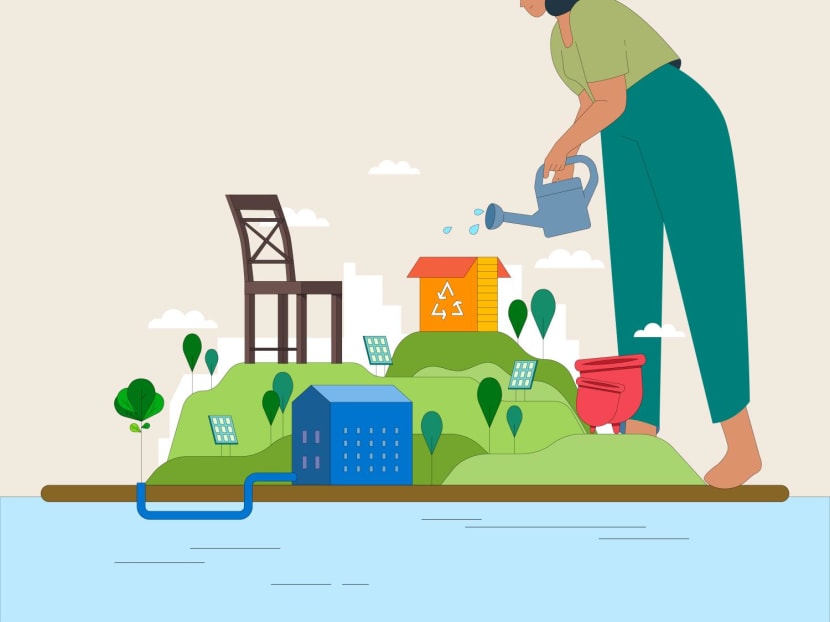
This article was written in partnership with Enterprise Singapore.
- More companies here are looking to create environmentally sustainable products and solutions
- There are also firms which are reinventing their production process to become more environmentally sustainable
- While these firms said that their costs have risen as a result, they regard the expenditure as worthwhile investment to ensure that their firms are ready for regulatory changes in the future
- Experts say that as environmental regulations change, there will be greater demand for green solutions, so firms should hop on the bandwagon sooner rather than later
- The Government is also stepping in to help these firms, with grants provided by Enterprise Singapore, for instance, for firms to be certified as environmentally sustainable
SINGAPORE — When Ms Karen Cheah was pursuing her masters in innovation at the Singapore Management University in 2019, her pitch about a sustainable food packaging solution “generated significant interest” among some venture capitalists who were listening to her presentation.
While they did not invest in her solution, which was part of a class project, they told her that it had the potential to solve the global problem of single-use plastic packaging.
Wasting no time, Ms Cheah, a former media executive, immediately embarked on her business idea in the same year, founding the start-up Alterpacks.
“The mission of Alterpacks is to use what is being thrown out to create food containers that would be a replacement to plastic disposables,” said Ms Cheah, who is in her 40s.
This was done through recycling waste, such as spent grains and agricultural waste, to create packaging that is biodegradable.
She first started by hiring a biomaterial researcher with money out of her own pocket, and used a room in her house as a makeshift laboratory to experiment with the materials needed to create her final product.
From those humble beginnings, Alterpacks eventually caught the eye of industry players and received support from the likes of Temasek Foundation and Enterprise Singapore (EnterpriseSG).
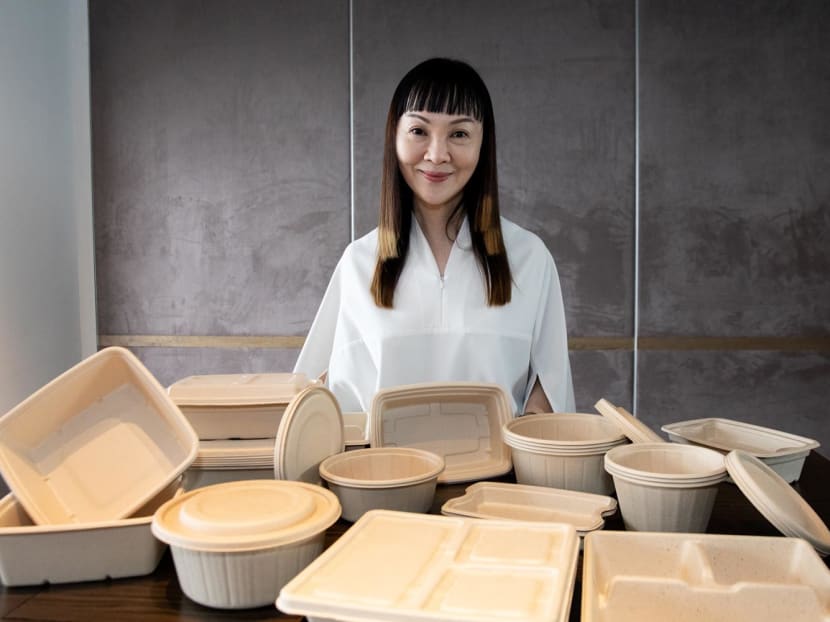
With their backing, Alterpacks was able to commercialise its product at the end of last year.
Ms Cheah said one of the firm’s goals is to make a product that can perform as well as, if not better than, traditional plastic containers.
Alterpacks containers are made entirely of organic waste, are safe for contact with food, able to hold soups and oily foods, and can be stored in the freezer or microwaved.
Although plastic containers are about 30 per cent cheaper to make than her alternative, Ms Cheah hopes that this will change in due time.
“With sufficient volume, we aim to get the price of the containers to compete with plastics,” she said. “We are still playing catch-up with a plastics industry that has a 100-year head-start.”
“But like all things, it’s just a matter of time and tech, where exponential leaps will allow us to provide our clients with solutions,” she added.
Alterpacks is not the only business that has embarked on an environmental sustainability journey.
In fact, many firms are vying to be part of an expanding ecosystem of environmentally sustainable initiatives in Singapore.
One of them is Blood, a “period care” start-up founded in 2014 by Ms Tan Peck Ying and Mr Caleb Leow. The firm produces more "environmentally friendly" sanitary pads as well as menstrual cups which are alternatives to sanitary pads and tampons.
Mr Leow, who is also head of business development for Blood, said that these menstrual cups can be reused for up to 10 years. This eco-friendly alternative can save up to over 1,500 sanitary pads that a woman may use in that time period.
While the menstrual cup can save not just the environment but also money otherwise spent on disposable sanitary products, Mr Leow noted that most women still do not prefer to use it yet, due to either habit or the fact that the cup may be uncomfortable for some.
So, in 2021, the company developed a sanitary pad with a top sheet that is made out of corn instead of plastic.
The corn topsheet is entirely biodegradable, unlike plastic top sheets used by some other brands. However, it comes at a cost to the firm — the topsheet can be 10 to 30 per cent more expensive than a regular topsheet.
“Environmentally-friendly materials tend to be more expensive because they haven’t (been produced on) a large scale yet,” said Mr Leow.
To overcome this, the firm seeks to ensure that its product performs as well as, if not better than, their competitors in terms of absorbability and retainment of liquid, so that consumers do not mind paying slightly more for them.
“By marrying the functional performance and also the more planet-friendly side, that’s how we attract a broader segment of consumers,” he said.

Singapore’s growing sustainability agenda is one that has developed not only organically, but is also due to a sustained push by the Government to nudge firms towards going green.
This is most evident in Singapore’s Green Plan 2030, announced in 2021, which aims to strengthen the country’s economic, climate and resource resilience, as well as improve the living environment of Singaporeans, among other goals.
It was also announced last year that Singapore’s goal is to reach net-zero emissions by 2050, with an earlier peak in carbon dioxide emissions than the 2030 target announced in 2020.
Industry observers and firms told TODAY that in recent years, they have seen companies, investors, and the Government coming together to ensure that green initiatives take off here.
On top of that, there is also a growing demand for auditing and consultancy services here, as more and more businesses require the relevant expertise and know-how in their bid to go green.
Providers of these services comprise both Singaporean consultancies, and international consultancies which have set up shop here in view of the opportunities available in Singapore and the region.
The range of firms jumping onto the green bandwagon has created a budding ecosystem, which will further help existing and new firms ride the sustainability wave.
And while these firms said that their costs have risen due to their own green initiatives, they regard the expenditure as a worthwhile investment to ensure that they are ready for regulatory changes in the future.
In fact, business and environmental experts told TODAY that it is not only advisable, but in fact crucial, that firms begin to plan how they want to go green.
This is because environmental regulations are fast catching up, and firms are going to be left behind if they do not act fast.
For instance, it was announced last year that Singapore’s carbon tax will be raised fivefold, from S$5 per tonne of greenhouse gas at present, to S$25 per tonne by 2024.
Carbon tax will be further increased progressively to S$45 per tonne in 2026, with a view to reach S$50 to S$80 per tonne by 2030.
“With all these movements going on, if you’re a business and you are numb to all these changes, it’s a disservice to your own basic survival,” said Professor Lawrence Loh, director of the centre of governance and sustainability at National University of Singapore (NUS) Business School.
“Sustainability has moved from just being a possibility to a necessity.”
A SUSTAINABLE TWIST TO AGE-OLD PRACTICES
Other than Alterpacks and Blood, which are promoting products aimed at solving environmental issues, other firms are evolving their production processes in “traditional” industries to be more environmentally sustainable.
One such firm is furniture retailer Myseat.sg, which was founded in 2016 by Mr Mike Gao, its managing director.
It had started out as a furniture trading firm, but then in 2018, expanded into manufacturing and selling its own products.
In doing so, Mr Gao wanted to make sure that his firm was producing furniture in an environmentally sustainable manner. This means making furniture that is free from formaldehyde, which is a harmful, cancer-causing substance used as glues and resins for furniture.
He was partly inspired to do this because he had a good friend back in secondary school who had been diagnosed with blood cancer at that time, but thankfully survived the illness.
“According to his doctor, it might have been due to the harmful substances contained in his newly renovated home,” he said.
“When we started manufacturing furniture, we did thorough research and actually looked at all the materials available in the market, and saw that (the use of formaldehyde) was actually still a major problem.”
So, Mr Gao embarked on a production method that was free of formaldehyde, such as by using a harmless water-based coating instead for his furniture, as well as another harmless substance called Osmo, developed in Germany.
However, he admitted that this process is “quite costly”, increasing his manufacturing costs by 20 to 30 per cent.
Other than using this formaldehyde-free coating, he also adopted other sustainability initiatives, such as sourcing wood only from sustainable plantations, and using miniatures for his showroom furniture pieces to save on resources.
The firm also manufactures furniture only on demand, rather than produce in bulk and toss the excess out should no one buy the stock.
“We only want to produce furniture for those who actually need it,” said Mr Gao. “We will not produce even one single piece of furniture just for the sake of lowering costs because of the economies of scale.”
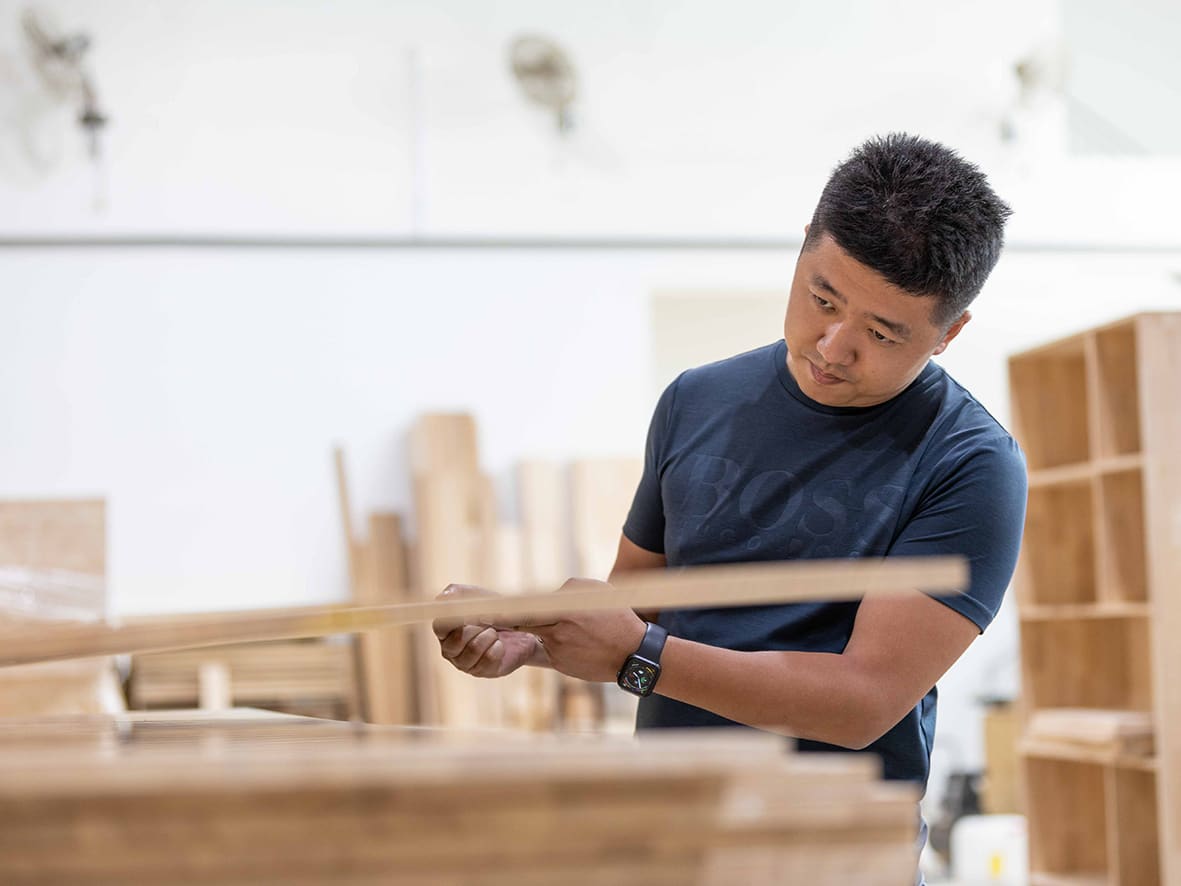
He added that he had also received help from EnterpriseSG, in the form of its Enterprise Development Grant, which helps companies transform their business practices.
Under this grant, Myseat.sg was able to apply for the Forest Stewardship Council certification, which certifies that the raw materials the company uses are sustainably sourced and cared for.
Mr Gao said that a part of the consultation and certification cost was covered by EnterpriseSG, the government agency championing enterprise development.
“We appreciate the help from EnterpriseSG (as) it saves a lot of hassle and lets clients know that these products are responsibly made,” he said.
Another firm that has moved away from traditional manufacturing methods is Vicplas Holdings, which designs, manufactures and distributes piping systems.
Mr Walter Tarca, the group chief executive officer of parent company Vicplas International, said that the firm was founded in 1993, but it was in 2016 that they decided to change their production processes to be more environmentally sustainable.
“(Vicplas) was ahead of its time in introducing heavy-metals-free plastic products into the Singapore marketplace,” he said.
This was done by eliminating heavy metals, such as lead and mercury, from the production of its plastic pipes.
These heavy metals, should they leak into the water that is supplied by the pipes, can lead to organ damage for humans, and are also harmful to the environment if they are released into reservoirs, for example.
The move by Vicplas is significant, as it supplies its products to various commercial and residential sites, along with being the predominant supplier for pipes used in Housing and Development Board (HDB) projects, said Mr Jay Cheng, Vicplas’ group operations director and environmental lead.
He added that instead of using heavy metals, the firm invested in a different concoction which involved harmless metals such as zinc, but this cost the firm at least 10 per cent more to produce.
“We sacrificed our bottom line, and we did it for a reason… There are a lot of people who work in the company and handle these ingredients, and we wanted our product to be heavy-metals-free so (there will be) no chance at all that they get leaked into the potable water system,” Mr Cheng said.
While Vicplas' bottom line was affected in the beginning, the company had managed to scale up and improve its work processes to bring costs down over the years.
In addition, like Myseat.sg, the company also benefited from the Enterprise Development Grant to attain ISO 14067 Certification, which provides guidelines for quantifying and communicating the carbon footprint of a firm’s products.
EnterpriseSG provided Vicplas with a grant to offset part of the consultation and certification cost.
Mr Cheng said: “Ethics is very important. If I want to make a lot of money… it's easy, I just find the cheapest thing I can find and the product comes out the same.
“(Going) green is never cheap, but what we are doing is investing in the future.”
He hopes that environmental regulations will be further tightened, so that all firms will have to play by the same rules for the good of the environment.
“When we all compete on equal grounds and everyone is certified green, that will level the playing field,” he said.
Aside from more firms adopting green solutions, there are also more consultancies and innovation accelerators looking to provide firms with the means to turn their business practices sustainable.
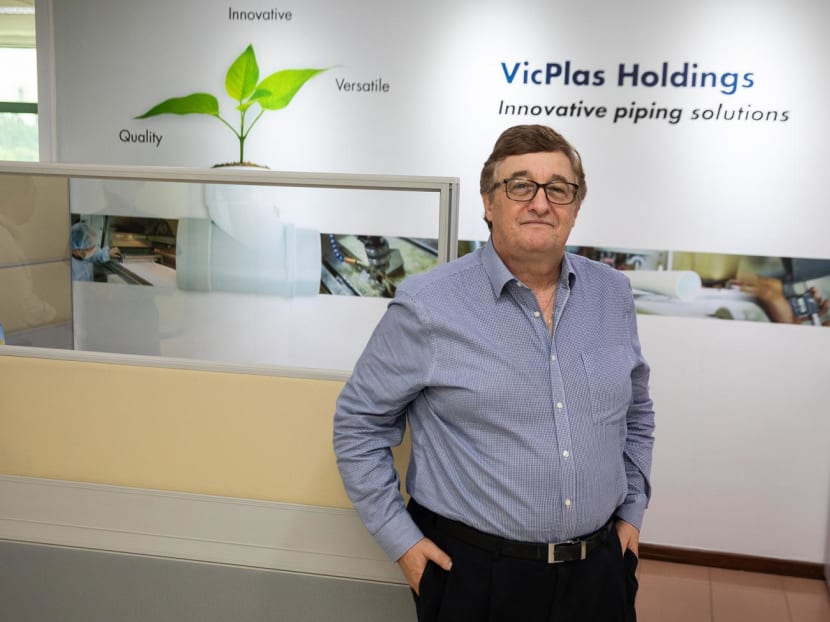
One of them is FinLab, an innovation accelerator organised by United Overseas Bank (UOB).
First launched in 2015 to help firms within the Association of Southeast Asian Nations digitalise, FinLab in 2021 launched its sustainability and innovation programme to help small and medium-sized enterprises (SMEs) and start-ups pursue greentech solutions.
Mr Shannon Lung, head of FinLab, told TODAY that through this programme, 700 SMEs in the region had signed up in the last two years, and of these, about 160 across the region had benefited by being matched with relevant stakeholders such as investors, as well as through FinLab’s education efforts on the importance of going green.
For example, FinLab had helped Ms Cheah’s Alterpacks in making connections with stakeholders such as investors and clients.
Mr Lung said that UOB had pushed the FinLab initiative as sustainability is “no more a buzzword” and is here to stay.
“Firms are changing, global markets are changing, larger corporations are changing and the Government is also placing down a lot of mandates,” he said. “If (firms) don’t come onto this journey and put in some form of investment, they will be lagging behind.”
FIRMS HAVE TO JOIN THE SUSTAINABILITY GAME: EXPERTS
Companies which are still hesitant to move towards a more sustainable future are in danger of being left behind, said business and sustainability experts.
Prof Loh from the NUS Business School said that companies should “absolutely embrace” the shift towards environmental sustainability, as there are three main risks for not doing so:
- Customer preferences may change. “Younger customers such as millennials and Gen Zs will be looking to patronise businesses that are more responsible environmentally”
- Investor preferences may change, where venture capitalists are now looking for business ideas that not only make sense in the present but can also be seen to be environmentally sustainable in the future
- Government regulations are evolving. “For example, in certain markets like the European Union… the regulations are evolving so fast, that right now, if you want to grab the market you have to be in the game, you have to be in the game of sustainability.”
Ms Melissa Low, a research fellow with the Centre for Nature-based Climate Solutions at NUS, said that while companies may incur higher costs in the short term, these initial investments in greener products would likely pay off in the future.
“Most or a large number of companies out there that go green, they experience better reputation, are more credible, and as they care about the environment, they might expand their audience and consumer base, with more young people buying from them,” she said.
On top of that, costs may also be saved in the long run, when production processes use less energy, or if the production process is less wasteful.
Other than businesses coming to their senses when it comes to sustainability, Dr Sumit Agarwal, a professor at NUS Business School, said that the Government’s role is also crucial in pushing more firms into the green space.
For instance, grants such as EnterpriseSG’s Enterprise Development Grant encourage firms like Myseat.sg and Vicplas to innovate, while the upcoming fivefold increase in carbon tax signals to firms that they need to move away from their traditional practices.
“If companies innovate, give them grants, if they behave badly, then there’s a tax for them,” he said.
For consumers, the Government could provide tax credits to those who buy more sustainable products, and also work with banks to ensure that they provide more green financing to consumers, he added.
“Which means, if the consumers are ‘green’, (banks) will give them cheaper mortgages, or cheaper auto loans,” he said.
For instance, consumers who purchase electric vehicles to reduce their carbon footprint could benefit.
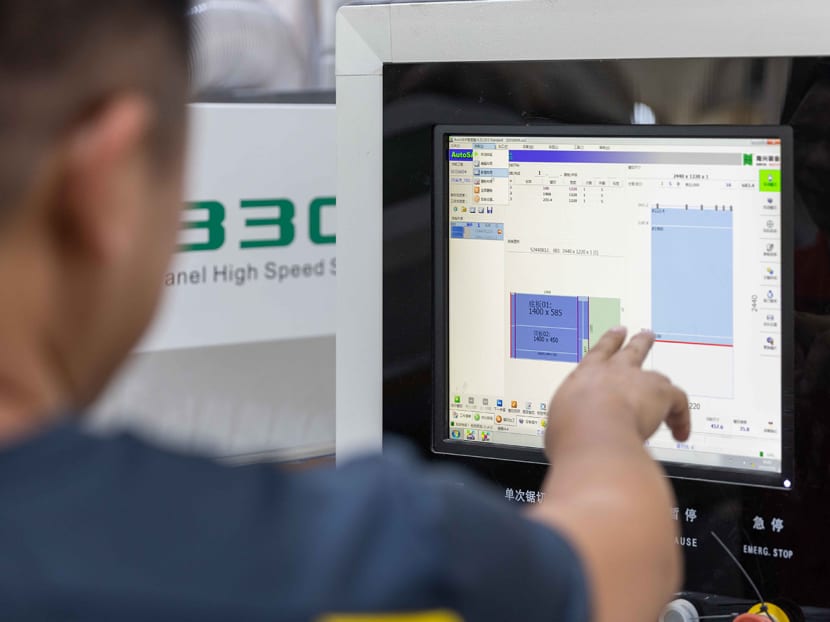
SINGAPORE CAN SERVE AS ‘LAUNCHPAD’ FOR SUSTAINABILITY IN THE REGION
Other than sustainability innovation accelerators such as FinLab, there have also been consultancies and advisories which have entered the Singapore market.
One consultancy that was founded here is Singapore Environmental Consultancy and Solutions, which was set up in 2014 to cater to firms on environmental projects in the petrochemical, marine, manufacturing and pharmaceutical industries, among others.
Another is Paia Consulting, which was founded in Singapore in 2002. According to its website, it helps helps companies assess environmental, social, and governance risks and opportunities, as well as implement sustainable solutions.
Foreign companies in this field have also chosen to set up offices in Singapore. These include Engie Impact, a subsidiary of French utilities company Engie Group. The firm focuses on providing sustainability and energy management consulting services to organisations here and in other parts of Asia-Pacific.
The emergence of such players came as no surprise to Ms Low.
“For Singapore, the Government has announced an ambition to become a carbon services hub, and there are some big names in management consulting here supporting a variety of issues,” she said.
While these consultancies do not necessarily focus on just sustainability, she said that Singapore is “definitely seeing an uptick in sustainability driven consulting here”.
Agreeing, Prof Loh said that Singapore is a “signature location” for sustainability consultants to be based in, and then subsequently “project to the region”.
“It has the critical confluence of infrastructure, network of ideas and incentive support particularly from the Government."
He added that Singapore is also a “powerful launchpad for sustainability as the broader ecosystem is honed to adopt sustainable innovations and practices”.
This ecosystem is aligned by larger thrusts such as the Singapore Green Plan, which ensures “everyone is on the same page”, Prof Loh said.
However, while it seems like a foregone conclusion that all sectors of the economy needs to embrace sustainability, Prof Sumit said that not all industries will move towards a greener future at the same pace.
Industries that are highly reliant on fossil fuels will take “a significantly longer time” to convert to more renewable energy sources, he said.
Also, a broad sector such as transport will take time to innovate and convert, as there are too many “entrenched interests” within it.
“There’s a whole supply chain, the automobile mechanic, the guys who make the (vehicle) parts, they are all relying on a certain kind of car being made, that is dependent on an engine which is relying on fossil fuel,” he said.
“When you make an electric engine, you are removing so many sectors that are ancillary to the automobile or truck industry.”
Dr Sumit said that for sectors with such entrenched interests, change may only come with regulation. However, this is difficult, as there is "limited political will" in some large economies that are the biggest pollutants.
"Singapore, Australia and Western Europe are able to (regulate effectively), but countries like China, India, Brazil and the US, they need to be on board fully," he said.
SUPPORT FOR FIRMS TO BE PART OF GREEN ECONOMY
EnterpriseSG chairman Peter Ong said during the agency’s year-in-review in February that there is an “increasing urgency” for companies to expedite the acquisition of environmentally sustainable capabilities .
This is because sustainability is now “front and centre” in many global conversations and a “dominant force driving industry trends”, while most Singapore companies are only just starting out on this journey.
Other than the Enterprise Development Grant that both Myseat.sg and Vicplas have benefited from, EnterpriseSG has launched several initiatives that help companies embark on sustainability initiatives:
- The Enterprise Sustainability Programme supports Singapore companies, especially SMEs, to build capabilities and capture new opportunities in the sustainability space, by helping them work with industry partners to develop sustainability initiatives and programmes
- It was announced in February that EnterpriseSG and the Ministry of Trade and Industry will be providing more support for business and workers as part of decarbonisation efforts. This includes the expansion of the Enterprise Sustainability Programme, as well as equipping workers with “green skills” to prepare them for a green economy
- On Thursday (March 23), EnterpriseSG announced that from April, it would be launching decarbonisation and sustainable finance courses for businesses under the Enterprise Sustainability Programme, in partnership with various stakeholders in the sustainability space.
Enterprise SG has had a steady uptake of its sustainability initiatives:
- More than 300 participants have benefited from the courses under the Enterprise Sustainability Programme, since they were launched in January last year
- The Enterprise Financing Scheme — Green was launched in October 2021 as part of the Enterprise Sustainability Programme. The scheme has provided S$120 million in green loans for over 30 SMEs in the solar energy, energy storage, energy efficiency technologies and electric vehicle technologies spaces.











